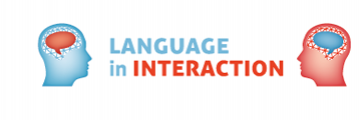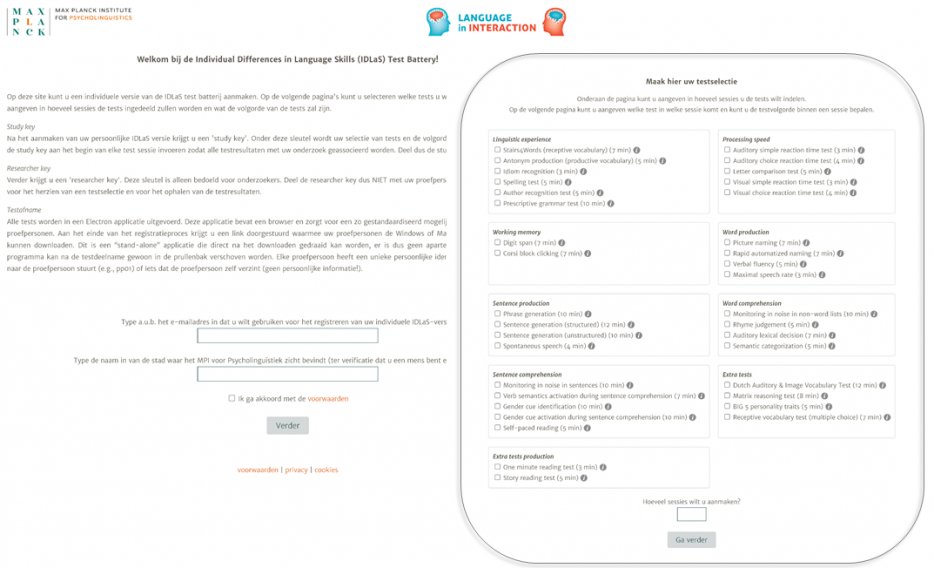Individual Differences in Language Skills Test Battery (IDLaS-NL)
What is the IDLAS-NL?
|
|
|
|
The Individual Differences in Languages Skills Test Battery for native speakers of Dutch (IDLaS-NL) is a flexibly adaptable test battery that can be used by researchers for scientific studies. Researchers can easily create their own version of the IDLaS-NL by selecting which tests they want to use. You can choose from different categories of measurement instruments, including 'linguistic experience', 'working memory', 'word/sentence production/comprehension' and 'processing speed'.
Researchers can manage their studies using their unique researcher key, which is generated at the end of the registration process. A separate study key is also generated for each study. It allows researchers to review or delete their study and to download (a selection of) the results. Results are retrieved using R scripts and then sent to the researcher's email address.
The IDLaS-NL is freely available for use in scientific research. Please refer to the following articles in your publications:
- Monen, J., Shkaravska, O., Withers, P., van den Heuvel, M., Weustink, J., Dirksmeyer, R., Meyer, A.S., & Hintz, F. (in preparation) Timing precision for online studies using the Individual Differences in Language Skills (IDLaS-NL) test battery.
- Hintz, F., Dijkhuis, M., van ’t Hoff, V., Huijsmans, M., Kievit, R.A., McQueen, J.M., & Meyer, A.S. (in revision). Evaluating the factor structure of the Dutch Individual Differences in Language Skills (IDLaS-NL) test battery. Brain Research.
- Hintz, F., Shkaravska, O., Dijkhuis, M., van ‘t Hoff, V., Huijsmans, M., van Dongen, R.C.A., Voeteé, L.A.B., Trilsbeek, P., McQueen, J.M., & Meyer, A.S. (2024). IDLaS-NL–A platform for running customized studies on individual differences in Dutch language skills via the internet. Behavior Research Methods, 56(3), 2422-2436.
Scientific background

The IDLaS-NL Test Battery was developed from 2017 to 2022 by a research team at the Max Planck Institute for Psycholinguistics in Nijmegen and was funded by the Language in Interaction Consortium. The battery is designed to contain different tests per cognitive construct.
Selected battery components have been evaluated in a number of pilot studies. Some of these studies have been published in scientific journals:
- Hintz, F., Voeten, C. C., McQueen, J. M., & Meyer, A. S. (2022). Quantifying the relationships between linguistic experience, general cognitive skills and linguistic processing skills. In J. Culbertson, A. Perfors, H. Rabagliati, & V. Ramenzoni (Eds.), Proceedings of the 44th Annual Conference of the Cognitive Science Society (CogSci 2022) (pp. 2491-2496). Toronto, Canada: Cognitive Science Society.Tilmatine, M., Hubers, F., & Hintz, F. (2021). Exploring Individual Differences in Recognizing Idiomatic Expressions in Context. Journal of Cognition, 4(1): 37, pp. 1–12.
- Kapteijns, B., & Hintz, F. (2021). Comparing predictors of sentence self-paced reading times: Syntactic complexity versus transitional probability metrics. PLoS One, 16(7): e0254546.
- Wolf, M. C., Meyer, A. S., Rowland, C. F., & Hintz, F. (2021). The Effects of Input Modality, Word Difficulty and Reading Experience on Word Recognition Accuracy. Collabra: Psychology, 7(1).
- Tilmatine, M., Hubers, F., & Hintz, F. (2021). Exploring Individual Differences in Recognizing Idiomatic Expressions in Context. Journal of Cognition, 4(1): 37, pp. 1–12.
- Brysbaert, M., Sui, L., Dirix, N., & Hintz, F. (2020). Dutch Author Recognition Test. Journal of Cognition, 3(1): 6.
- Jongman, S.R., Khoe, Y.H., Hintz, F. (2021). Vocabulary size influences spontaneous speech in native language users: Validating the use of automatic speech recognition in individual differences research. Language and Speech, 64(1), 35-51.
- Hintz, F., Dijkhuis, M., Van ‘t Hoff, V., McQueen, J.M., & Meyer, A.S. (2020). A behavioural dataset for studying individual differences in language skills. Scientific Data 7, 429.
- Hintz, F., Jongman, S.R., Dijkhuis, M., Van 't Hoff, V., McQueen, J.M., Meyer, A.S. (2020). Shared lexical access processes in speaking and listening? An individual differences study. Journal of Experimental Psychology: Learning, Memory, and Cognition, 46(6), 1048-1063.
The validity of each of the tests can be found in the FAQ. Despite the extensive piloting and standardization work that went into the development of the test battery, no guarantees are given about the completeness and precision of the tests. The IDLaS-NL has been developed first and foremost for application in a fundamental scientific context and should therefore not be used for diagnostic purposes. At the moment, the IDLaS is only available for Dutch speakers, but versions for other languages are under development.
Additional tests
In addition to the tests developed in the context of the IDLaS-NL, six additional tests have been implemented that may be of interest for use in scientific research. These tests were developed by researchers at Dutch, Belgian, English and US universities and as such have not been piloted by the IDLaS-NL team. The relevant tests can be found under the headings: “Extra tests” and “Extra tests production” during the creation of a study. The tests measure the following:
- Receptive vocabulary size (word-picture mapping): Dutch Auditory & Image Vocabulary Test (Bousard, I., & Brysbaert, M. (2021). The Dutch Auditory & Image Vocabulary test (DAIVT): A new Dutch receptive vocabulary test for students. Psychologica Belgica, 61(1), 1)
- Receptive vocabulary size (multiple choice, Vander Beken, H., Woumans, E., & Brysbaert, M. (2018). Studying texts in a second language: No disadvantage in long-term recognition memory. Bilingualism: Language and Cognition, 21(4), 826-838)
- Non-verbal reasoning ability: Matrix reasoning test (Chierchia, G., Fuhrmann, D., Knoll, L. J., Pi-Sunyer, B. P., Sakhardande, A. L., & Blakemore, S. J. (2019). The matrix reasoning item bank (MaRs-IB): novel, open-access abstract reasoning items for adolescents and adults. Royal Society Open Science, 6(10), 190232)
- BIG 5 personality traits (Denissen, J.J.A., Geenen, R., Soto, C.J., John, O.P., & van Aken, M.A.G. (2020) The Big Five Inventory–2: Replication of Psychometric Properties in a Dutch Adaptation and First Evidence for the Discriminant Predictive Validity of the Facet Scales. Journal of Personality Assessment, 102:3, 309-324)
- Word reading ability: One minute reading test (Callens, M., Tops, W., & Brysbaert, M. (2012). Cognitive Profile of Students Who Enter Higher Education with an Indication of Dyslexia. PLoS ONE 7(6): e38081; Tops, W., Callens, M., Lammertyn, J., Van Hees, V., & Brysbaert, M. (2012). Identifying students with dyslexia in higher education. Annals of Dyslexia, 62, 186-203)
- Story reading ability (Rouweler, L., Varkevisser, N., Brysbaert, M., Maassen, B., & Tops, W. (2020). The Flamingo test: a new diagnostic instrument for dyslexia in Dutch higher education students. European Journal of Special Needs Education, 35(4), 529-543)
User manual
After you have registered as a researcher with an email address, you can easily and quickly create your own test batteries using our intuitive interface. Researchers simply select which tests they want to include in their study and can manage this study in a central location. Data are stored on IDLaS-NL's servers and results can be requested with the push of a button. See below for how to get started with the IDLaS-NL Test Battery.
1. RegisterGo to the Welcome page and enter an email address to create an account. This will be your account name. A researcher key will be generated automatically and sent to the email address you provided. You need this key to manage all your studies. |
2. Create StudyPress New Study to create a study. Make a selection of the tests to be included. Specify the number of sessions. Press Continue. Then specify the test order within each session and finalize your study by pressing Submit Study. |
3. Manage StudyOnce logged in, you can use your study key and researcher key to adjust existing studies (press Edit Study) and request the results (press Request Results). Results are retrieved using R scripts and sent to the researcher's email address. Depending on the number of tests and the number of tested participants, this may take a little while. |

All tests in IDLaS-NL are carried out in an application called Electron. This application contains a browser (Chrome) with which a reliable and standardized test environment is realized on the computers of the participants. At the end of the registration process, the researcher receives a link where Windows and Mac Electron versions can be downloaded. Electron is a “stand-alone” application. This means that after downloading the file, participants do not have to install anything. Instead, Electron can be run on the fly. Participants can easily remove Electron after completion of the study moving the file into the recycle bin. In addition to the Electron download link and the study key, participants need a unique identifier to use Electron. This can be an ID sent by the researcher (for example: part01) or something the participant makes up themselves (no personal information!).
Contact and frequently asked questions
E-mail: IDLaS-NL [at] mpi.nl
FAQ: https://www.mpi.nl/idlas-nl/faq
Researchers involved:
- Dr. Florian Hintz is Senior Investigator at the Max Planck Institute for Psycholinguistics and coordinator of the Individual Differences in Language Skills cluster.
- Prof. Dr. James McQueen is professor of Speech & Learning at Radboud University.
- Prof. Dr. Antje Meyer director at the Max Planck Institute for Psycholinguistics and professor at Radboud University.



Share this page